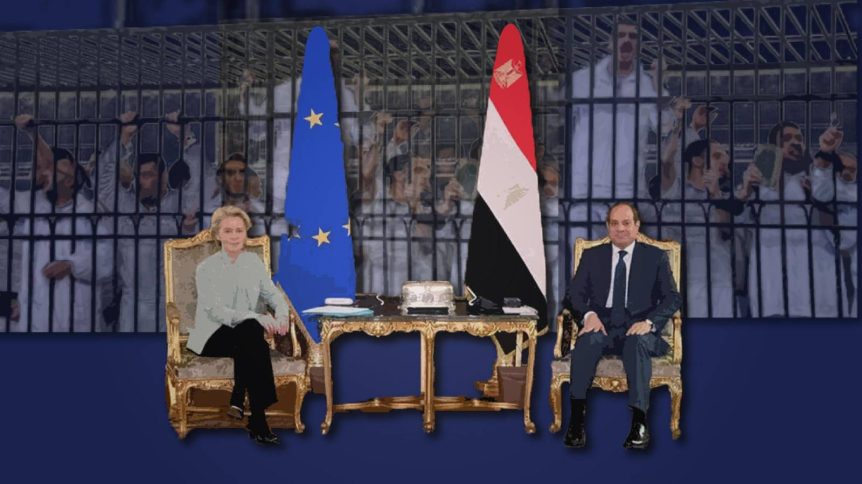The EU has just signed its latest and biggest-yet deal with an authoritarian regime in the MENA region, pledging €7.4 billion of EU support to the Egyptian government and joining other international efforts to throw President Abdelfattah al-Sisi a lifeline at the expense of their human rights commitments and Egypt’s long-term stability. For PresidentSisi, receiving the economic and political support entailed by the deal despite consistently demonstrating no clear intention to address Egypt’s human rights crisis, nor the policies that led to potential economic collapse, will only encourage him to double down on the same path. Now EU member states and the European Parliament must rally to set strong accountability, human rights and governance conditions on any potential budget support and on the EU soft loans in macro-financial assistance to Egypt, ensure parliamentary scrutiny and co-decision on them; and push for robust human rights safeguards on the programming for migration cooperation. If not, this EU taxpayers’ money will further enable Sisi’s unaccountable governance and rights violations, burdening Egyptian citizens with interest payments, and failing to durably stabilize the country and avert mass emigration.
The “Joint Declaration on the Strategic and Comprehensive Partnership” between Egypt and the European Union signed by European Commission President Ursula von der Leyen with Egyptian President Abdelfattah al-Sisi on 17 March, states that
“Egypt and the EU will continue to work on their commitments to further promote democracy, fundamental freedoms, and human rights, gender equality and equal opportunities, as agreed in the Partnership Priorities. The EU stands ready to assist Egypt in the implementation of its National Strategy for Human Rights in alignment with the provisions of the Association Agreement and the Partnership Priorities 2021-2027.”
Yet the Egyptian authorities have thoroughly dispelled the seriousness of their self-proclaimed human rights reform. Initiatives such as the National Strategy for Human Rights and the National Dialogue were grand declarations and formal processes that served as window-dressing, as the human rights situation in fact deteriorated. Between the May 2023 start of the National Dialogue and March 2024, authorities released 796 political prisoners while arresting 2,374 others.[1] These include members of the presidential campaign of Ahmed al-Tantawi, who attempted to challenge President Sisi in the elections that took place in December 2023. Not only was al-Tantawi effectively prevented by the authorities from running in elections, but he has now been sentenced to one year in prison in retaliation for his attempt.
President Sisi’s unsustainable, one-man rule has also fuelled Egypt’s repeated economic crises over the past decade, exposing Egyptian citizens to skyrocketing inflation and hardship while bringing the country to the brink of debt default in 2023. External shocks have had an impact on the country, but its structural issues are rooted in the same absence of accountability as the human rights crisis. The unchecked power wielded by the President and the military through exorbitant and opaque megaprojects and excessive borrowing have allowed them to pursue enrichment, control and regime survival rather than stability and development.
Throughout the ongoing crisis, Sisi has continued to assure the Egyptian public he intends to continue on the same course, all the while stifling open policy debate and brutally silencing peaceful dissent. Recently, the Egyptian parliament passed a law that expands the military courts’ jurisdiction over civilians, to include any offenses the President deems related to “national security”, including economic ones.
Thus, the EU must set robust accountability, transparency and human rights conditions on its financial assistance to Egypt, or it will allow Egyptian authorities to continue promoting instability and continued crisis, avoid real, substantive reform and consequently feed further into refugee and migration flows as people seek a safe and dignified living elsewhere. Member States and the European Parliament (EP) must also demand that all the EU’s macro-financial assistance to Egypt be subject to the regular approval procedure by co-decision of the Council and EP, with proper debate and scrutiny of the conditions.[2]
Though only a fraction of the total announced amount of EU support is formally earmarked for migration, this theme was omnipresent during the 17 March visit from six European leaders to Cairo. European migration cooperation and border control programming must include solid human rights due diligence mechanisms to avoid contributing to rights violations, and truly help meet the needs of the increasing numbers fleeing to Egypt. They must ensure no EU funds, equipment or other assets are provided to entities involved in the many documented human rights abuses on record in this field, notably the Interior and Defense Ministries.
Now is the time for the European Parliament and Member States to take action and push EU leaders to forgo the counterproductive bolstering of authoritarianism, squandering billions and increasing the debt burden jeopardizing Egyptian citizens’ future, to allow Al-Sisi to continue pursuing enrichment and regime survival. To truly promote Egypt’s long term stability and resilience, bringing a little hope to the many Egyptians and others in need of a future, there is no alternative to leveraging EU support and assistance for reforms to restore accountability, rights, democracy and inclusive governance in Egypt.
[1] According to numbers documented by the “Till the Last Prisoner” campaign, from the Egyptian Commission for Rights and Freedoms (ECRF)
[2] The European Commission has proposed to expedite approval of 1 billion out of the 5 billion euros of proposed macro-financial assistance to Egypt through the urgent procedure (under Art. 213 TFEU) which only requires approval by the Council of the EU, not the European Parliament. Since Egypt has recently received 57 billion USD in various pledges of financial support, this is not justified.
Share this Post

